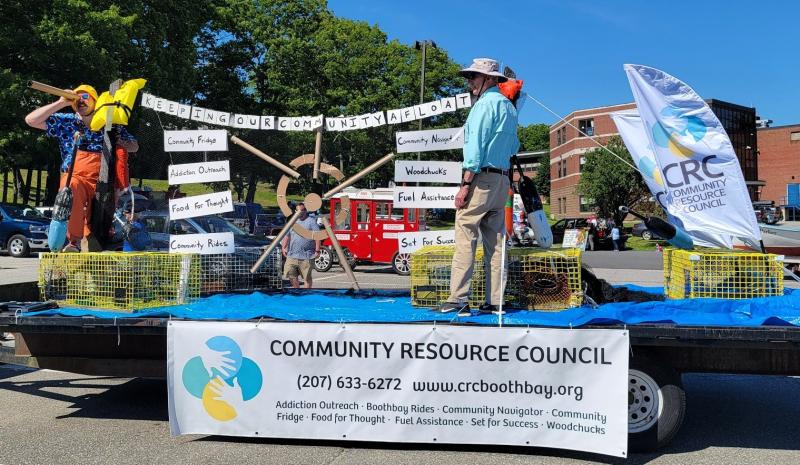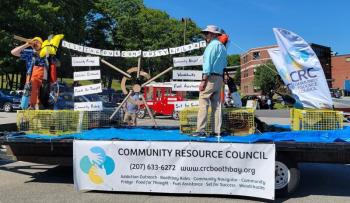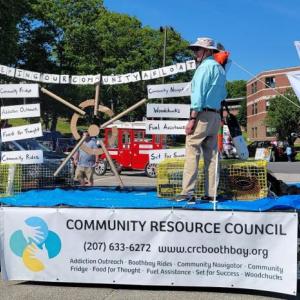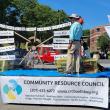Helping hands across the peninsula: The Community Resource Council
It’s a dreaded noise – a clanking under the car. After a visit to the mechanic, the repair could come to hundreds of dollars in unanticipated expenses, ones many on the Boothbay peninsula may struggle to afford.
“When you live moment to moment, you don't have a budget, you don't plan ahead,” said Holly Stover, director of operations at the Community Resource Council (CRC). Something like a surprise mechanical problem can keep someone from getting to work, which may mean the loss of their job and spiraling consequences thereafter. However, Stover said a $300 repair could get them back on the road, and back to work.
“Sometimes there are really simple solutions to what appear to be complex problems,” she said. "Small amounts of funding (can) be used to solve really big problems.”
The CRC is one of the area’s most active nonprofits. Its mission is “to assist people in need on the Boothbay peninsula by providing information, referrals, resources and programs.”
The idea for the CRC dates to 2004, when pastors from the Congregational Church and St. Columba's Church gathered people from law enforcement, social services, schools and other community-minded groups to brainstorm ways to help. They eventally solidified, identifying tangible needs and pooling resources to support people in the Boothbay peninsula, where services, and access to them, are limited.
The CRC has grown extensively. Its three full-time staff help coordinate about 100 volunteers who power the organization’s eight programs, including those that provide heating assistance, food, transportation, and addiction outreach. Altogether, Stover said CRC’s programs spent around $442,000 in 2024, helping about 1,300 people in the region.
“All of our programs have been created based on a need in our community,” Stover said. She later added, “We couldn't do all this without the community. It is a volunteer-driven, community-driven set of programs under one umbrella agency, and we're incredibly fortunate.”
Founded around 2011, the Community Navigator was the CRC’s first program, and now is its anchor. Anyone coming to the CRC starts by meeting Hannah Corkum, the program lead, who assesses their needs and directs them to resources. She also teaches people how to access benefits, helps them apply for state and federal aid, and provides budgeting assistance.
“I'm able to show them what they need to know, and then some of them don't come back. I might not see them ever again or I might not see them for a couple of years. So, that's a satisfaction in itself. It's just like being able to teach folks the basics of what they need to know to be able to do it on their own,” she said.
Stover said the CRC provides direct assistance at the ground level when people need it. That includes financial support, and also 24/7 access to the CRC's community fridge or heating assistance during a cold snap. She said the CRC does not receive state or federal funding, which allows them to be flexible and nimble.
Stover said there are government programs that overlap with the CRC’s aid, and people seeking the CRC’s help must also apply for them, but it can take a long time before benefits arrive. Corkum, a licensed social worker, used to work for state agencies and said the break from red tape is refreshing.
"The flexibility here, that's how I feel that the most impact is made,” Corkum said. “Being able to sit down and have a conversation with folks and follow through with what their needs are as opposed to just handing them a referral and saying, ‘This is what you need to go do.’”
According to Stover, the only taxpayer support the CRC receives is from local towns and the county, which make up around 14% of their annual income. Most of their support comes from grants, foundations and donations.
“We would not exist without our donors. We clearly would not exist,” Stover said of people regardless of if they give $5 or $5,000. “The goodwill that exists in this community, I guess I would have to say blows my mind sometimes. Really so does the capacity of people to care about one another here.”
But a tightknit community can be complicated, and one of the CRC’s priorities is to uphold the privacy of the people they help. From keeping personal information confidential, to not bringing attention to recipients, Stover said every one of the CRC’s programs strives to reduce the stigma and shame around being in need. Ultimately, she said to never think twice about asking for help.
“I would suggest to anybody, anybody out there that is struggling in any way to reach out to us, and there's always something we can do,” she said. “Everybody's finances are complex. And we can always find pathways. There are answers for everything. And nobody should ever feel too alone, too embarrassed to just ask. Just ask. There's no wrong question. There's no bad question. Never.”
























